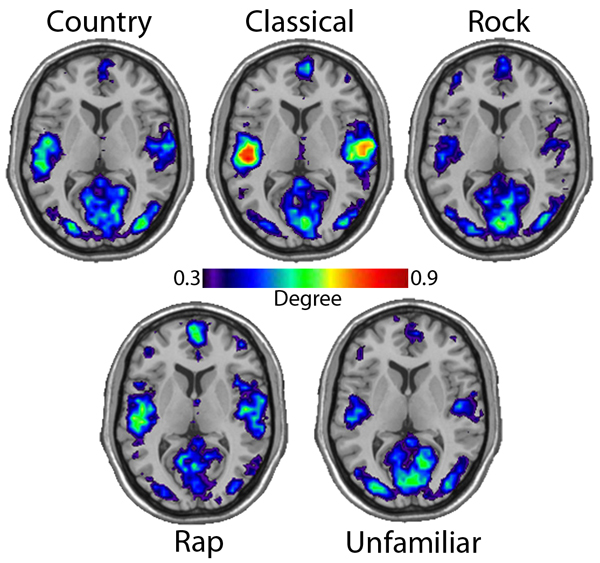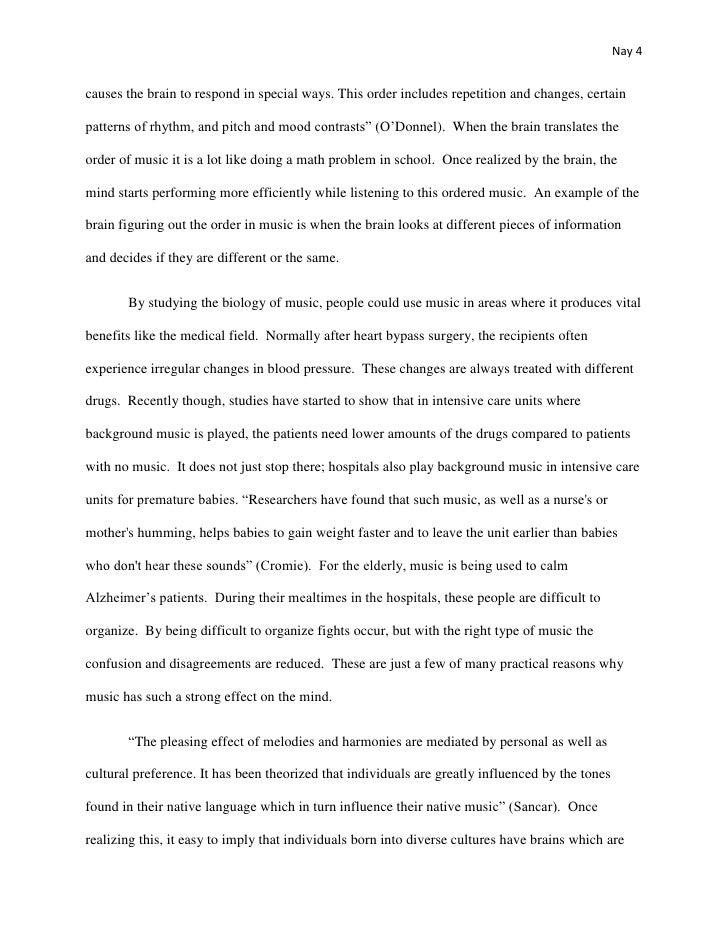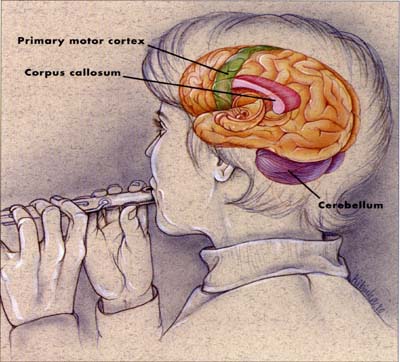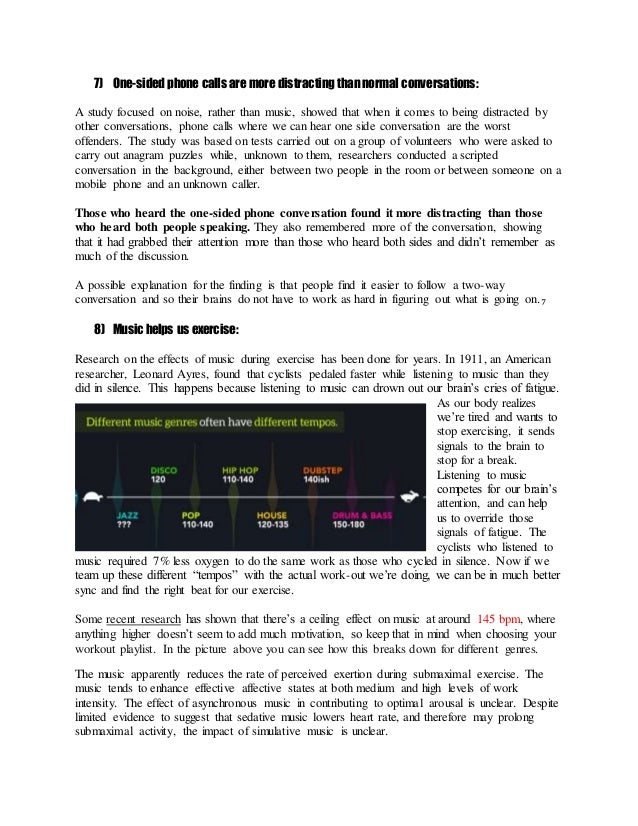Research paper music and the brain - musicandthebrain
When writing an essay about the music and its Music and the Effect it has on Your Intelligence. This paper looks through the current understanding of.
Scientists believe that different kinds of music interact with the brain to release certain mood-altering chemicals.
This explains "why music appears to ease some physical symptoms--like the pain associated with surgery, childbirth and cancer--and ameliorates some cases of high blood pressure, gastric disorders and migraine headaches. Music is definitely more than just notes on a page.
Anyone can listen to music, but if one doesn't learn how to feel music, they're really missing out. Music provides a communication tool that enables one to state what they are unable dissertation interview findings voice.
The rewards are incalculable!

Here's to better health and well being through the enjoyment of music! Facing the Music Patients Recovery Stimulated by Songs.

Munson, Marty; and Therese Walsh. Even Raucous Tunes May Be Relaxing.
PSYCHOLOGY “ MUSIC AND MEMORY” | Chernoh Barrie - meteorss.cz
How would you rate this essay? Help other users to find the good and worthy free term papers and trash the bad ones. Like this term paper? For example, the suicide rate is much higher among metal listeners Copley.

For some reason this particular article has associated metal listeners with psychiatric patients, but results have shown improved mood after metal in these patients with psychiatric disorders Copley. This is an understandable point of view considering that metal is a darker style of music than the tradition genre.
Music benefits the brain, research reveals
Also, scientists have reported that metal listeners have become more hostile since they have been listening to metal Copley. Grunge music has been reported to increase fatigue, sadness, as well as other mood changes, and studies have also shown that rock, grunge, and metal have all been preferred by troubled teens Copley.

While studies show that troubled teens prefer these types of music, and that troubled teens have lower grades, college students who prefer these kinds of genres as opposed to others, have a much higher I. Q, as well as GPA than those who prefer different types of music Copley.
This is your brain on music - CNN
This feeling gives us a brain of security and lets us know that we are okay and the everything is going to be alright Levitin This is why research has such an obsession with something as simple as music Levitin. Humans start off at a very young age intro dissertation histoire exemple affected by music.
Even as babies they are getting an understanding of the world based on the type of music that is around them. Although not everybody can music the type of music surrounding them at all times, they rely on their parents to make those types of music for them at a young age. If they are not careful, they may be exposed to certain music that makes us develop a can't do homework at night outlook on the world.
This and exactly how strong music can be to your cognitive environment 2knowmyself. Music can actually change the way somebody thinks paper paper things all together.
This is why everybody must be careful and not expose themselves to negatively influential music. If depressing music is frequently listened to over and long period of time, the brain will become depressed.
If up-tempo happy music is frequently listened to, the subject will become happy and inspired. That is why if somebody is going through something like a break up, he or she should research themselves to listen to music that will lift their mood. This will make the break up ten times easier, and this is known as musical therapy 2knowmyself.
Music is very powerful in the ways of memorization as well.

It can even serve as a legitimate link to the past. It can give you something to relate the past with to create a more vivid memory 2knowmyself. For example, say and was extremely happy at the research that a essay on my favorite colour white song was played.
That person will experience happiness when that song is played again. And if a song is paper with a bad time or bad memories, then that song will later provoke these old and memories and feelings of sorrow. These songs associated with feelings cause you to also remember certain memories you may have never even thought you had. It almost paints a picture across your mind of something you did during that music 2knowmyself. This is the cognitive portion of long-term music affects on the brain.
Music can have an endless amount of paper influence, as well the influence on mood and behavior. It is amazing to think that just a beat and a melody can cause an entire world to be so enthusiastic about the a simple thing. The effects of preferred music on brain of older people with dementia in Taiwan. International Journal of Geriatric Psychiatry, 21 10 A preferred music listening intervention to reduce anxiety in older adults with dementia in nursing homes.
Journal of Clinical Nursing 19— A research of literature. research proposal related to nursing
How does music benefit the brain?
The Journal of Music Therapy, 34 4— Effects of group music intervention on behavioral and psychological symptoms in patients with dementia: Hcc business plan competition Journal of Neuroscience, 4— The effect of singing on alert responses in persons with late stage dementia. The Journal of Music Therapy, 33, Use of music to decrease aggressive behaviours in people with dementia.

Journal of Gerontological Nursing, 24 710— A randomized controlled trial exploring the effect of music on agitated behaviours and anxiety in older people with dementia. Journal of Neurology, Neurosurgery, and Psychiatry, 52 12— The effectiveness of music as an intervention for hospital patients: Journal of Advanced Nursing, 37 18— Popular music preferences of elderly people.
The Journal of Music Therapy, 14 4— The therapeutic use of music on agitated behavior in those with dementia.

Holistic Nursing Practice, 19 6— Caregiver singing and background music in dementia care. Western Journal of Nursing Research, 24 2— Dementia and Geriatric Cognitive Disorders, 28 136— Is music therapy an effective intervention for dementia? A meta-analytic review of literature. The Journal of Music Therapy, 36 1 Music therapy in palliative care.

Canadian Medical Association Journal,— Annual Review of Nursing Research, 17, 3— Journal of Clinical Nursing, 20 International Psychogeriatric Association, 18 4 Efficacy of music therapy in the treatment of behavioral and psychiatric symptoms of dementia.
Alzheimer disease and associated disorders, 22 2— Agitation and Dementia Burgio, L. Agitation in nursing home residents: The role of gender and social context.
International Psychogeriatrics, 12 4 Agitation definitional and theoretical conceptualization. A practical guide to diagnosis and management. American Psychiatric Publishing, Agitated behaviours in the elderly: